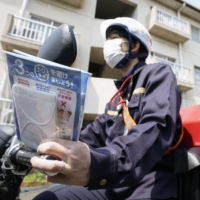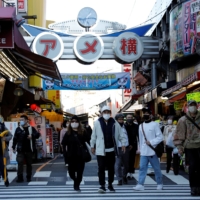Japan is considering distributing unused cloth masks, dubbed "Abenomasks," to local governments after a large amount procured by former Prime Minister Shinzo Abe's administration remained locked away accumulating storage costs, Chief Cabinet Secretary Hirokazu Matsuno said Wednesday.
The storage of the massive amount of masks has sparked public criticism that it was a waste of taxpayer money. The top government spokesman said at a news conference the masks can be sent to municipalities that wish to "stockpile them for use in disaster situations and distribute them to local residents."
The masks can also be given to nursing facilities and individuals on demand, he added.
Around 81.3 million such masks, which were widely criticized by the public for being too small and arriving late amid a shortage of masks in the initial phase of the coronavirus pandemic, were being kept in storage as of late October. Storage costs between August 2020 and March this year amounted to some ¥600 million ($5.3 million).
The Abe government had procured a total of 287 million masks, including 130 million for his plan to distribute two cloth masks to each household in Japan last year. The remainder was meant to be delivered to elderly care facilities and pregnant women.
Deputy Chief Cabinet Secretary Yoshihiko Isozaki said in October the government had finished distributing cloth masks to households but switched to an on-request basis for nursing facilities, and that led to the surplus.
Regarding his predecessor's mask rollout, Prime Minister Fumio Kishida said Tuesday in parliament there were "points that need to be investigated and reflected upon."
"Going forward, the Ministry of Health, Labor and Welfare will continue to consider ways to make use of the remaining stock," Matsuno said.





